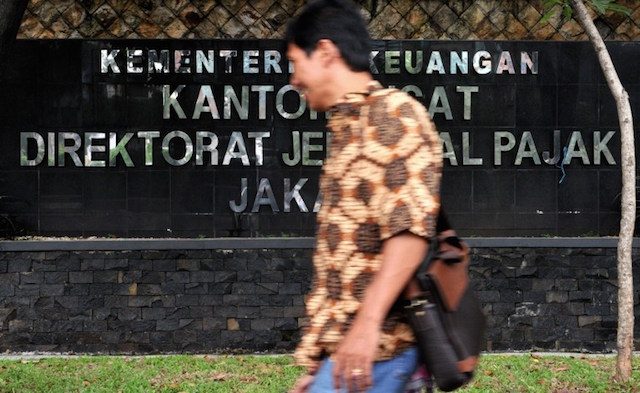SUMMARY
This is AI generated summarization, which may have errors. For context, always refer to the full article.

JAKARTA, Indonesia – Indonesia will crack down on corporate tax avoidance via transfer pricing this year to try and recoup IDR200 trillion ($15.6 billion) in lost state income, mainly in the commodities sector, the new head of the tax office told Reuters.
President Joko “Jokowi” Widodo’s administration, which took office in October, is planning to double its infrastructure spending this year to build ports, power plants and other projects, and the tax office figure for lost income would cover more than two-thirds of that spending.
As a proportion of gross domestic product (GDP), Indonesia, Southeast Asia’s largest economy, has one of the lowest tax takes in the region, trailing behind Malaysia, Singapore, Thailand and the Philippines, according to the World Bank.
Sigit Priadi Pramudito, the country’s director-general of taxes, said in an interview late on Monday that many Indonesian companies, particularly in the coal, palm oil, cocoa and other commodities sectors, were avoiding corporate taxes by using transfer pricing.
He declined to give names, but said some of them were major companies.
Under the transfer pricing method, an Indonesian company sells its goods to a subsidiary in another country below market prices, and the subsidiary in turn sells them to the market.
This effectively reduces profits in Indonesia and increases them in that foreign country.
“There’s a lot of potential in this area. We suspect that all along, they have been using the transfer pricing method,” Pramudito said. “This year we will chase them.”
The tax office has the authority to adjust the tax bill of a company if it suspects that a sale to a related entity is under-priced.
In the past, it was difficult to prove companies had under-priced their goods as the tax office lacked comparable data on market prices, Pramudito said.
But now it has collected more comprehensive data and is increasing its number of officers, he said, adding that it could take such companies to a tax court and indeed had won some such cases.
Jokowi plans to add 4,000 taxmen per year to its existing 36,000 to help achieve an ambitious tax revenue target of IDR1,489.3 trillion this year, up 30% from last year’s collection.
During his presidential campaign last year, Jokowi pledged to increase tax collection to 16% of GDP from about 12%, and the tax office is keen to close any loopholes.
The tax crackdown on the resources sector comes at a time when the prices of commodities have fallen to multi-year lows due to slowing global economic growth and ample supplies, setting the stage for a showdown with these companies.
Even so, many of them are still making big profits, Pramudito said.
“The prices of commodities have dropped, but the costs are still cheap. The fact is, their profits are still tremendous, and using that method (transfer pricing) adds to the profits.”
Indonesia’s finance minister has said Southeast Asia’s largest economy will review its tax treaties with dozens of countries and may suspend those it concludes are being abused for tax avoidance.
When asked whether the tax crackdown will hurt the investment climate in Indonesia, Pramudito said the country’s hope to boost investment should not come at the expense of tax compliance.
“How can you build an investment climate on the basis of tax avoidance?” – Rappler.com
*$1 = IDR12,860
Add a comment
How does this make you feel?
There are no comments yet. Add your comment to start the conversation.